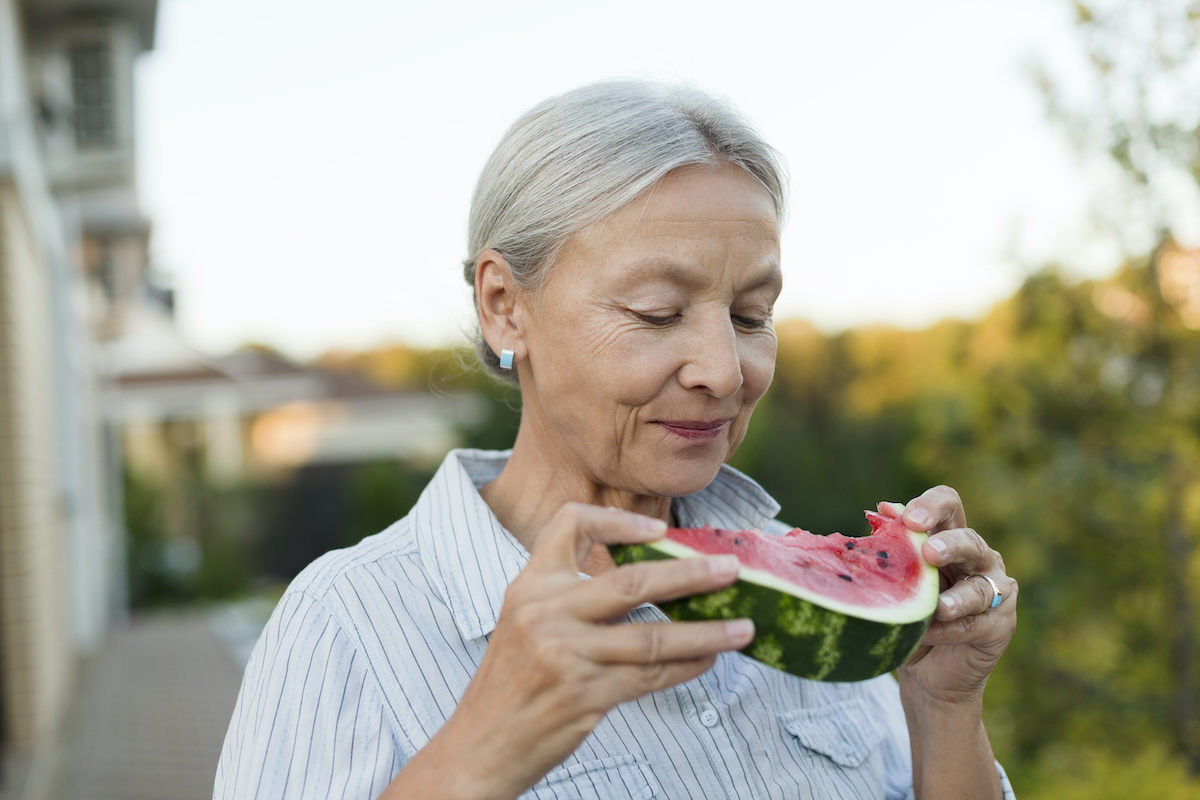What Is Intuitive Eating—and Should You Try It?
This non-diet regimen promotes self-acceptance and letting go of rules around food. Here’s how to decide if it’s right for you.

The Whole-Body Wellness Challenge is rooted in the understanding that health isn’t just about fitness. This month, we’re sharing fun and easy ways to bring everything you love about SilverSneakers classes and your time at the gym to other areas of your life. You’ll find workouts, tips, and activities to help you build strength, eat healthier, sleep sounder, and be more present in your life, so you can feel good—body, mind, and spirit.
In the world of healthy eating, “diet” might as well be on the list of four-letter swear words. Even Weight Watchers, the most venerated name in shedding excess pounds, rebranded as “WW” to take the focus off weight loss. The current trend is all about accepting your body, ditching diets, and throwing away the scale.
These now-popular ideas come from an approach to food called intuitive eating. If you’re on social media, you’ve likely heard about it. But this non-diet regimen is more nuanced and complex than what can be explained in a single graphic or caption.
Here, we look to research and talk to experts to break down intuitive eating and help you decide if it might be right for you.
What Is Intuitive Eating?
This approach to nutrition isn’t new. It goes back to 1995, when a pair of registered dietitians named Evelyn Tribole and Elyse Resch coauthored a book called Intuitive Eating. It was a response to the idea that typical weight-loss diets don’t work for most people.
Tribole and Resch wanted to create an alternative approach that helped people get off the yo-yo dieting cycle and make peace—permanently—with food and their bodies.
The program is based on 10 principles. You can read them in full here, but this is the gist:
- Stop dieting
- Eat when you’re hungry and stop when you’re full
- Choose foods and exercises based on how they make you feel
Over time, it’s become increasingly popular for registered dietitians to use the intuitive eating framework with their clients.
“I like it because it’s not a diet. It has general principles and not rules,” says Marisa Michael, R.D.N., founder of Real Nutrition coaching in Portland, Oregon. “It’s very holistic in that it addresses food, body image, exercise, and emotional health, which are all connected.”
It’s also a weight-neutral model, she adds. The goal isn’t about hitting a certain number on the scale—it’s about having a better relationship with food and your body. That’s one reason this approach can be especially helpful for people who have a history of disordered eating or those frustrated by years of failed weight-loss efforts.
The Benefits of Intuitive Eating
If you’ve been dieting for decades, this philosophy can be a little disorienting. After all, research overwhelmingly supports the idea that maintaining a healthy weight—which may require weight loss for some—is protective against conditions such as diabetes, heart disease, and cancer. But for many people, the reality is that they haven’t been able to lose weight and keep it off.
“Intuitive eating allows a practitioner to meet you where you are,” says Samantha Cassetty, R.D.N., a New York City–based dietitian and coauthor of Sugar Shock.
For some, intuitive eating can offer a path to better physical and emotional well-being by taking the focus off body weight and onto how you feel. Success is divorced from the number on the scale.
Michael has seen firsthand the benefits of intuitive eating in her client’s lives. “They begin to have less anxiety around food. They start to understand that restrictive diets aren’t helpful,” she says. “It can be freeing.”
Many studies have been conducted on intuitive eating, which is why experts often tout the approach as evidence-based. To date, much of the research focuses on mental health and body image, and it suggests that intuitive eating can help people feel better about themselves and relax about food.
There are fewer studies that show intuitive eating’s effects on measurable health metrics, such as blood pressure, cholesterol, and weight.
A 2018 study suggests that the framework can help improve self-esteem and ease obsessive food and dieting behavior. And there is some evidence that it may improve diet quality: A 2021 study published in the Journal of Nutrition Education and Behavior found that people practicing intuitive eating ate more fruits and vegetables than other adults.
If you’ve struggled with yo-yo dieting, body image issues, or anxiety around eating, practicing intuitive eating may indeed help you find a sense of peace when it comes to food and your body.
Common Myths About Intuitive Eating
If you learned about intuitive eating on social media, you might think it’s the pizza, pasta, and doughnuts diet. Emphasis is often placed on the program’s lack of restriction and unconditional permission to eat whatever you want.
“A lot of people, when they first hear about intuitive eating, think they’ll be out of control with food and gain a lot of weight,” Michael says. In practice, that isn’t as common as you might think.
There’s this idea that intuitive eating throws nutrition out the window, but that just isn’t true. Nutrition does come into play under the “Honor Your Health—Gentle Nutrition” principle of the intuitive eating framework, which involves paying attention to how certain foods make you feel physically.
Both Michael and Cassetty say that even when intuitive eating newbies eat a lot of the treats they’ve long denied themselves, it’s usually just a phase. The food choices people make change as they learn to focus on how food makes them feel.
For example, “if someone ate cake for breakfast, pizza for lunch, and ice cream for dinner, they might notice it makes them feel bloated and lack energy,” Michael says. That’s an example of the “gentle nutrition” principle in action.
“Intuitive eating is about opening up lines of communication with your body,” adds Cassetty, so that you can better recognize hunger and fullness signals.
This can be challenging at first, because certain eating and lifestyle habits can distort those all-important signals. For example:
- Research published in the journal Cell Metabolism found that eating a diet rich in ultra-processed foods (think: packaged snack cakes, frozen dinners, and fast-food hamburgers) caused people to eat 500 more calories per day than those who ate an unprocessed diet, even though both groups were allowed to eat as much as they wanted.
- Lack of sleep causes people to eat more than well-rested people.
- Caffeine is a well-known appetite suppressant, and research suggests that alcohol can artificially stimulate your appetite.
The takeaway: “If you really want to pursue intuitive eating, you may want to look closely at things that disrupt your natural hunger and fullness cues,” Michael says.
Contrary to popular belief, intuitive eating isn’t simply choosing what would taste the most delicious at any given time. It often extends to choosing more whole foods, getting enough sleep, and being aware of how what you eat and drink affects your eating behavior.
But What About Weight?
Because intuitive eating is not explicitly pro weight loss or anti weight loss, three things can happen, according to Michael:
Subscribe to our newsletter
It's quick and easy. You could be one of the 13 million people who are eligible.
Already a member? Click to discover our 15,000+ participating locations.
Follow Us
- You may lose weight
- You may gain weight
- Your weight may stay the same
Weight loss can be a side effect of learning to listen to and honor your body’s cues, Michael says. On the flip side, longtime dieters or people who have been especially restrictive about what they eat may find their weight drifting up. How any weight changes that result from intuitive eating may affect your health is something you should discuss with your doctor.
If you’ve been advised to lose weight for your health, research suggests that intuitive eating may not be the most effective route for you. Research published in the journal Obesity Science & Practice found that people who practiced intuitive eating lost little to no weight by following the program, and some subjects gained weight.
They also showed no improvement in other metrics of health, such as blood pressure and fasting glucose. Another study, published in the journal Nutrition and Health, compared intuitive eating to calorie restriction for weight loss and found that calorie restriction was more effective.
No matter which plan you follow, however, Cassetty says it’s still important to ask yourself these questions: What am I truly in the mood for? What would be really satisfying? Taking time to focus can lead to choices that are both pleasurable and healthy. To that end, Cassetty thinks that the principles of intuitive eating can work side by side with health goals that include weight loss.
For instance, people trying to lose weight may think that they should be eating baby carrots as a snack. But they may end up overeating later because they didn’t eat something truly satisfying, Cassetty explains. When people start asking themselves what they’re truly in the mood for, what would really be satisfying, it can lead to food choices that are both pleasurable and healthy.
“If you’re in the mood for something chocolatey and crunchy, you can choose to have a few cocoa-dusted almonds and move on with your day,” she says. That’s a pattern that’s more likely to lead to positive health outcomes than eating carrot sticks now and a sleeve of chocolate chip cookies later.
How to Get Started with Intuitive Eating
If you think intuitive eating might be right for you, reach out to a registered dietitian who specializes in it (you can search for someone near you here). Or ask your doctor to recommend a dietitian who is open to this approach.
You can certainly learn more about getting started on your own. The Intuitive Eating book and author Evelyn Tribole’s website (IntuitiveEating.org) are both great resources. But since everyone has a unique background and goals, it’s best to get one-on-one support initially, if you can.
And remember, you don’t have to follow intuitive eating to the letter to benefit from its principles of self-care and self-acceptance. In fact, if you’re strictly practicing intuitive eating, you might be missing out on other tools that could work for you, Cassetty says.
For example, frequent weigh-ins and food journaling are both research-backed techniques for losing weight and improving your health—but intuitive eating discourages these practices. You can take what works for you and leave the rest, Cassetty says.
Science backs this up: A recent study presented at the European Society of Cardiology’s Euro Heart Care – ACNAP Congress 2021 found that an approach that blends the emotion-centered, judgment-free aspects of intuitive eating with a structured program of nutrition education and food journaling helped obese adults lose weight and lower their blood pressure and cholesterol levels over 10 weeks.
“I don’t think any single tool—whether it’s intuitive eating, the scale, a food tracking app, whatever it may be—is right for everybody or wrong for everybody,” Cassetty says. That’s why talking with a registered dietitian can be so helpful: You can discuss a variety of tools to determine what’s best for you.
Take Your Favorite SilverSneakers Classes Online!
SilverSneakers members can access live fitness classes and wellness workshops through SilverSneakers LIVE. See the latest schedule and RSVP for classes here.
Not a member? If you have a Medicare Plan, it may include SilverSneakers—at no additional cost. Check your eligibility instantly here.





